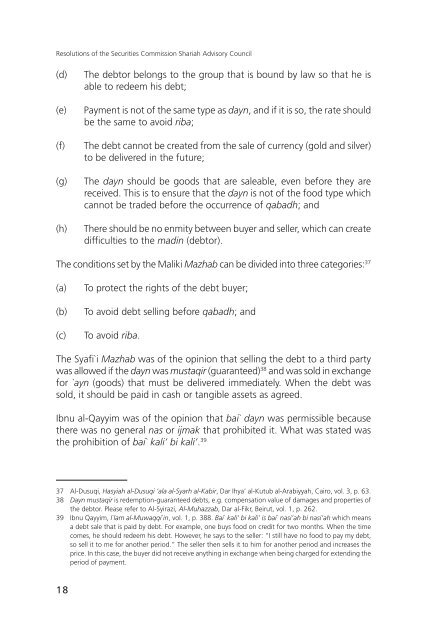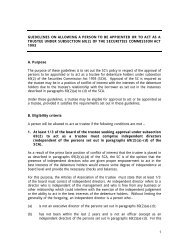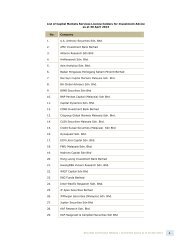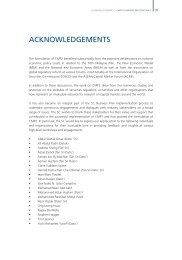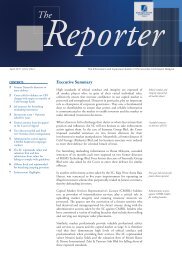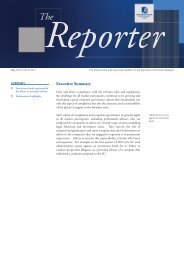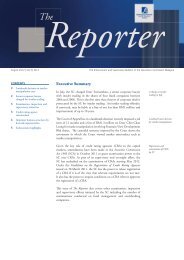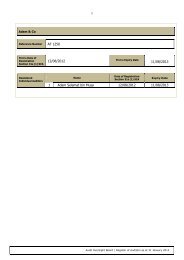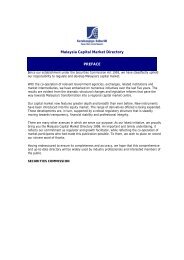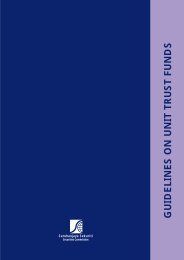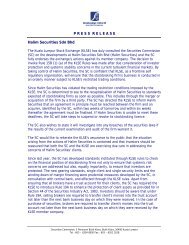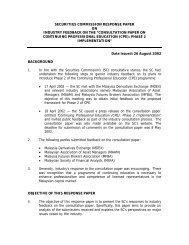Resolutions of the Securities Commission Shariah Advisory Council
Resolutions of the Securities Commission Shariah Advisory Council
Resolutions of the Securities Commission Shariah Advisory Council
Create successful ePaper yourself
Turn your PDF publications into a flip-book with our unique Google optimized e-Paper software.
<strong>Resolutions</strong> <strong>of</strong> <strong>the</strong> <strong>Securities</strong> <strong>Commission</strong> <strong>Shariah</strong> <strong>Advisory</strong> <strong>Council</strong><br />
(d) The debtor belongs to <strong>the</strong> group that is bound by law so that he is<br />
able to redeem his debt;<br />
(e) Payment is not <strong>of</strong> <strong>the</strong> same type as dayn, and if it is so, <strong>the</strong> rate should<br />
be <strong>the</strong> same to avoid riba;<br />
(f) The debt cannot be created from <strong>the</strong> sale <strong>of</strong> currency (gold and silver)<br />
to be delivered in <strong>the</strong> future;<br />
(g) The dayn should be goods that are saleable, even before <strong>the</strong>y are<br />
received. This is to ensure that <strong>the</strong> dayn is not <strong>of</strong> <strong>the</strong> food type which<br />
cannot be traded before <strong>the</strong> occurrence <strong>of</strong> qabadh; and<br />
(h) There should be no enmity between buyer and seller, which can create<br />
difficulties to <strong>the</strong> madin (debtor).<br />
The conditions set by <strong>the</strong> Maliki Mazhab can be divided into three categories: 37<br />
(a) To protect <strong>the</strong> rights <strong>of</strong> <strong>the</strong> debt buyer;<br />
(b) To avoid debt selling before qabadh; and<br />
(c) To avoid riba.<br />
The Syafi`i Mazhab was <strong>of</strong> <strong>the</strong> opinion that selling <strong>the</strong> debt to a third party<br />
was allowed if <strong>the</strong> dayn was mustaqir (guaranteed) 38 and was sold in exchange<br />
for `ayn (goods) that must be delivered immediately. When <strong>the</strong> debt was<br />
sold, it should be paid in cash or tangible assets as agreed.<br />
Ibnu al-Qayyim was <strong>of</strong> <strong>the</strong> opinion that bai` dayn was permissible because<br />
<strong>the</strong>re was no general nas or ijmak that prohibited it. What was stated was<br />
<strong>the</strong> prohibition <strong>of</strong> bai` kali’ bi kali’. 39<br />
37 Al-Dusuqi, Hasyiah al-Dusuqi ‘ala al-Syarh al-Kabir, Dar Ihya’ al-Kutub al-Arabiyyah, Cairo, vol. 3, p. 63.<br />
38 Dayn mustaqir is redemption-guaranteed debts, e.g. compensation value <strong>of</strong> damages and properties <strong>of</strong><br />
<strong>the</strong> debtor. Please refer to Al-Syirazi, Al-Muhazzab, Dar al-Fikr, Beirut, vol. 1, p. 262.<br />
39 Ibnu Qayyim, I`lam al-Muwaqqi`in, vol. 1, p. 388. Bai` kali’ bi kali’ is bai` nasi’ah bi nasi’ah which means<br />
a debt sale that is paid by debt. For example, one buys food on credit for two months. When <strong>the</strong> time<br />
comes, he should redeem his debt. However, he says to <strong>the</strong> seller: “I still have no food to pay my debt,<br />
so sell it to me for ano<strong>the</strong>r period.” The seller <strong>the</strong>n sells it to him for ano<strong>the</strong>r period and increases <strong>the</strong><br />
price. In this case, <strong>the</strong> buyer did not receive anything in exchange when being charged for extending <strong>the</strong><br />
period <strong>of</strong> payment.<br />
18


